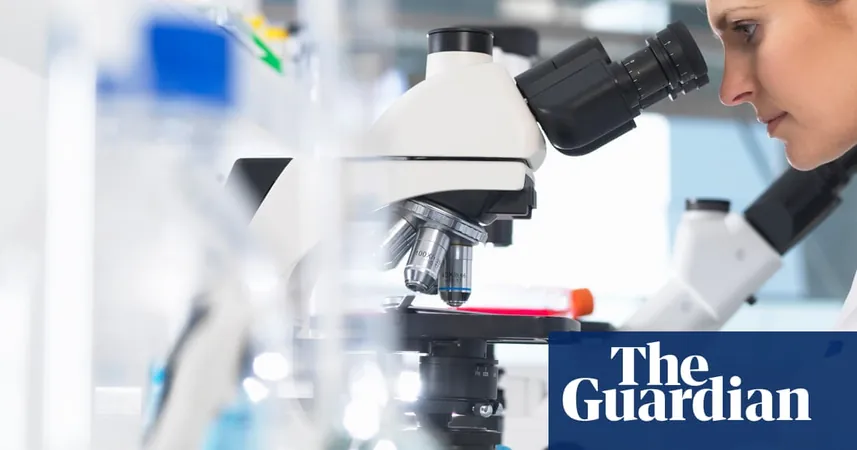
Breakthrough AI Tool Set to Revolutionize Coeliac Disease Diagnosis!
2025-03-27
Author: John Tan
A groundbreaking development in artificial intelligence (AI) could drastically transform the process of diagnosing coeliac disease, a condition that impacts nearly 700,000 individuals in the UK. Despite its prevalence, the journey to a precise diagnosis can often stretch over many years, causing significant distress for patients.
Understanding Coeliac Disease
Coeliac disease is an autoimmune disorder triggered by the consumption of gluten—a protein found in wheat, rye, and barley. The symptoms, including stomach cramps, diarrhea, skin rashes, weight loss, fatigue, and anemia, can severely impact quality of life. If left untreated, the disease can lead to dire complications such as malnutrition, osteoporosis, infertility, and an elevated risk of certain cancers and other autoimmune conditions.
Current Diagnostic Process
Typically, the diagnostic process for adults begins with a blood test to detect antibodies related to gluten, followed by a biopsy of the duodenum. The biopsy samples are then meticulously examined by pathologists for damage to the villi—small projections that play a crucial role in nutrient absorption.
AI Innovation in Diagnosis
However, researchers at the University of Cambridge have pioneered a revolutionary AI tool designed to accelerate this diagnostic process. This state-of-the-art algorithm was trained on over 4,000 imaging samples sourced from five different hospitals, utilizing five unique scanners from various manufacturers. The recent study, published in the New England Journal of Medicine AI, concluded that the AI tool is not only as accurate as seasoned pathologists in diagnosing coeliac disease, but it also performs the task significantly faster.
Expert Opinions
Elizabeth Soilleux, a consultant haematopathologist and professor of pathology at Cambridge, emphasized the urgency of improving diagnosis timelines. "The current healthcare climate places immense strain on systems, and the delays patients face can be frustrating. AI promises a quicker diagnosis, reducing pressures on NHS waiting lists," she stated.
Dr. Florian Jaeckle, a co-author of the study, commented on the traditional analyst's daunting workload, taking between five to ten minutes per biopsy. In contrast, this AI model generates diagnostic results instantaneously—within a minute—immediately after scanning the biopsy sample. "Duodenal biopsies often find themselves at the bottom of the pathologist's list of priorities. However, AI can provide results without delays, essentially eliminating the waiting game," he concluded.
Funding and Future Prospects
Funded by organizations including Coeliac UK and the National Institute for Health and Care Research, this promising study has garnered attention from the medical community. Dr. Bernie Croal, president of the Royal College of Pathologists, affirmed the potential of the AI tool to "radically change the landscape of coeliac disease diagnosis," enhancing patient outcomes and reducing waiting times.
While the excitement surrounding AI in pathology is palpable, Croal acknowledged that more developments are necessary for safe and widespread implementation within the NHS. This includes investment in digital pathology, seamless IT systems for data sharing, and adequate training for pathologists on AI utilization.
Conclusion
In a world where speed and accuracy are crucial to patient health, this revolutionary AI diagnostic tool offers hope for coeliac disease sufferers, promising to cut through the confusion and delays that have long marked their journey to health. Stay tuned for further updates as this technology continues to evolve!




 Brasil (PT)
Brasil (PT)
 Canada (EN)
Canada (EN)
 Chile (ES)
Chile (ES)
 Česko (CS)
Česko (CS)
 대한민국 (KO)
대한민국 (KO)
 España (ES)
España (ES)
 France (FR)
France (FR)
 Hong Kong (EN)
Hong Kong (EN)
 Italia (IT)
Italia (IT)
 日本 (JA)
日本 (JA)
 Magyarország (HU)
Magyarország (HU)
 Norge (NO)
Norge (NO)
 Polska (PL)
Polska (PL)
 Schweiz (DE)
Schweiz (DE)
 Singapore (EN)
Singapore (EN)
 Sverige (SV)
Sverige (SV)
 Suomi (FI)
Suomi (FI)
 Türkiye (TR)
Türkiye (TR)
 الإمارات العربية المتحدة (AR)
الإمارات العربية المتحدة (AR)